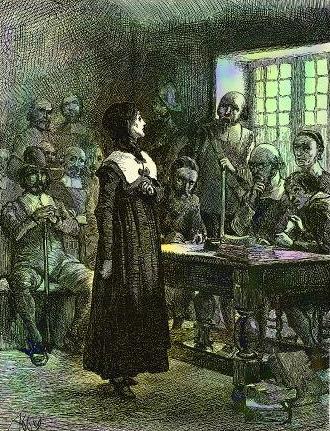Anne Hutchinson (1591–1643), a Puritan religious leader and preacher who was tried and convicted for heresy, has been variously portrayed as a defender of feminism and of freedom of religion.
Hutchinson convicted for heresy pre-First Amendment era
Because she left no writings behind, most of what scholars know about her comes from the accusations of others, but her trial in 1637 provides a window to the Puritan world of the 16th and 17th centuries when church and state were not separated.
Although Hutchinson’s conviction for heresy violates principles that later were incorporated into the First Amendment, she and her accusers lived under a system with an established church where individuals who undermined the church were perceived as threats to the state.
Hutchinson’s teachings were thought to undermine church authority
Born in Lincolnshire, England, Anne Marbury married Will Hutchinson at the age of 21. In 1634, she and her family followed John Cotton, a Puritan minister, who had immigrated to the Massachusetts Bay Colony a year before. There she served as a midwife and soon had large numbers of church members attending Bible studies at her house.
Although Hutchinson supported Cotton and John Wheelwright, her brother-in-law, also a minister, she believed that most established clergy were operating under a covenant of works rather than of grace. She questioned whether one could tell the redeemed from the unredeemed on the basis of their lives, instead believing that she gained such knowledge by the direct witness of the Holy Spirit. In the eyes of Massachusetts governor John Winthrop, such a teaching undermined the authority of church teachers and was a sign of antinomianism, or opposition to all law.
Hutchinson exiled for defaming ministers
Hutchinson was brought to trial for three charges:
- breaking the Fifth Commandment by dishonoring the fathers of the Commonwealth;
- improperly holding meetings in her home; and
- defaming authorized ministers.
She had a keen mind, and historians generally agree that she bettered her accusers on the first two charges (with Winthrop appealing to his authority as a man rather than to the superiority of his arguments), but she effectively affirmed the latter charge by claiming that she had received direct revelations from God.
Such revelations called the authority and necessity of the church into question, and Hutchinson and about sixty followers were exiled to Rhode Island. In time, she and a number of family members moved to New York, where they were killed by Native Americans.
John Vile is professor of political science and dean of the Honors College at Middle Tennessee State University. He is co-editor of the Encyclopedia of the First Amendment. This article was originally published in 2009.

